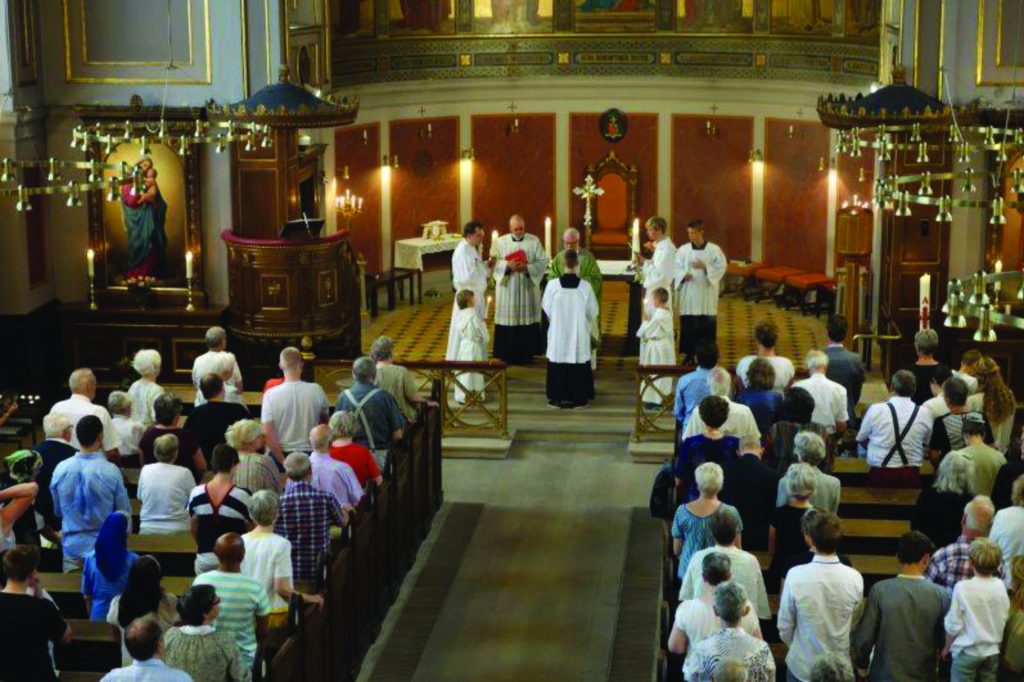Is it wrong to demand that a country’s people be able to understand what is being preached within its borders?
This is the question being asked by many Danes, as Denmark prepares to debate proposed legislation demanding that all sermons and homilies in the country be translated into Danish.
The government thinks the move is necessary to combat the threat of Islamic extremism, since most mosques in the country serve immigrant communities in their native languages.
However, the proposal has evoked a strong reaction from the country’s minority religions — including the Catholic Church — which object to the financial hardships the legislation would have on struggling congregations, as well as the “general suspicion” about religious believers it implicitly endorses.
Nearly 75% of the Scandinavian country’s population belongs to the Church of Denmark, a Lutheran body. Like the Church of England, the Church of Denmark is an established church, with Margrethe II serving as its head, and the national parliament legislating its rules. Members of the Church of Denmark pay a mandatory “church tax” to support the institution.
However, only around 3% of the population attends Sunday services, and less than 20% of Danes consider themselves to be religious.
About 4.4% of the population is Muslim, mostly immigrants and refugees from Muslim-majority countries, while less than 1.5% of the population is Catholic, mostly immigrants from Eastern Europe. The country’s only Catholic seminary was founded in the 1990s and depends largely on vocations from other countries.
Religious services for immigrant communities are often held in their mother tongue, although some religious communities will use English as a common language. In addition, Denmark’s long-established German community has been conducting services in the German language for centuries.
Leaders of religious minorities complain that the proposal is onerous, since it will involve not only translating Sunday homilies, but also daily services and sermons at baptisms, weddings, and other special events.
Many non-Lutheran clerics are foreigners, often with limited Danish, especially written Danish, and will have to hire translators.
Religious leaders also point out it will do nothing to stamp out radical Islam, since extremists almost always attend nonregistered places of worship.
The proposed legislation is opposed by both the Nordic Bishops’ Conference — which covers all of Scandinavia — and COMECE, the bishops’ association for the European Union.
Cardinal Jean-Claude Hollerich of Luxembourg, the president of COMECE, said the impact of the legislation “would be of imposing undue hindrance on the fundamental right to freedom of religion.”
He added that the Danish proposal “is part of a broader, increasing trend of neglection of the fundamental right to freedom of religion in the EU member states, and even at the EU court’s level.
“COMECE concerns on the general state of freedom of religion in the EU had already been expressed in reacting to extremely rigid national measures imposed on Churches and religious communities with regard to religious ceremonies, in view of COVID-19,” the cardinal continued. “Eroding specific rights in such a way endangers the whole architecture of fundamental rights, based on the idea of universality and interconnectedness of rights.”
Hollerich’s strong language points to the growing disconnect between the view on human rights proposed by the Church and that by a rapidly secularizing European society.
In Denmark’s case, this is compounded by a populace used to the government interfering in the affairs of the state church. For instance, Church of Denmark parish churches are required by law to perform same-sex marriages and clergy members are employees of the state.
Instead of prioritizing religious liberty, or at least making exceptions for it, it is treated as one of many competing “rights.” In this case, national security facing a threat of Islamic extremism was considered more important than the religious freedom of people worshiping in non-Danish languages.
Similarly, kosher and halal butchering are illegal in Denmark and several other European countries because the animals are not stunned before they are killed; animal rights were considered more important than the rights of religious minorities to observe their dietary laws.
Jewish groups, aware of similar legislation passed in the earliest days of the Nazi regime, claim such laws carry anti-Semitic undertones.
Although many claim an anti-religious bias in all of this, it is probably more accurate to speak of a religious indifference. As fewer and fewer people attend religious services — especially among the elites — European leaders will treat religious belief as no different than any other organization’s ideas and principles.
Where religious belief intersects with received secular wisdom — such as Pope Francis’ environmental encyclical “Laudato Si’” — the state will support it; where it doesn’t — such as on abortion, sexual orientation, and gender issues — it won’t give it a pass.
This is causing more conflict between the government and churches in Western Europe, especially as new “rights” to abortion, women’s equality, and same-sex marriage seem in conflict with the right to religious liberty.
Although many think the First Amendment will always give religious groups the upper hand in such conflicts in the United States, they shouldn’t forget that Europe has the same rights enshrined in most of its foundational documents, at both the European Union and Council of Europe level.
In the end, secularism has usually trumped religion. Americans would do well to look at what’s happening in Europe to prevent it from happening in the U.S.

